|
|
|
Sort Order |
|
|
|
Items / Page
|
|
|
|
|
|
|
| Srl | Item |
| 1 |
ID:
178720
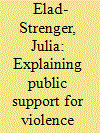

|
|
|
|
|
| Summary/Abstract |
What drives citizens’ support for violence against domestic political actors? Despite its potentially devastating consequences, there is surprisingly little research on the antecedents of this unique form of political violence. Building upon recent insights on the psychological implications of exposure to conflict on support for political violence, we examined the motivations underlying public support for violence against politicians in the context of protracted conflict. Using a two-wave panel design among Jewish-Israelis, we examined the interactive effects of conflict-induced perceived threat, psychological distress, and political orientation on support for violence against politicians. Consistent with previous findings on the psychological implications of conflict, our findings suggest that conflict-induced threat perceptions play an important role in predicting support for violence against politicians. Nevertheless, our findings point to important boundary conditions to these effects: the strength of the relationship between perceived threat and attitudes towards political violence is qualified by the level of chronic conflict-related psychological distress, and the direction of the effects of perceived threat is qualified by individuals’ self-placement on the left-right continuum. More specifically, we found that perceived threat increased rightists’ support and decreases leftists’ support for violence against politicians, only under high, but not low, conflict-related psychological distress. The main conclusion of this study is that support for violence against politicians can be seen as an ideology-driven protective strategy against the negative psychological implications of exposure to violent conflict. By pointing to the importance of understanding the interactive role of psychological and political factors in determining public support for such acts, our findings therefore contribute to the understanding of a relatively understudied phenomenon with potentially catastrophic effects on political stability.
|
|
|
|
|
|
|
|
|
|
|
|
|
|
|
|
| 2 |
ID:
150992
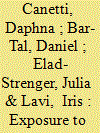

|
|
|
|
|
| Summary/Abstract |
Does ongoing exposure to political violence prompt subject groups to support or oppose compromise in situations of intractable conflict? If so, what is the mechanism underlying these processes? Political scholarship neither offers conclusive arguments nor sufficiently addresses individual-level forms of exposure to violence in the context of political conflict, particularly the factors mediating political outcomes. We address this by looking at the impact of exposure to political violence, psychological distress, perceived threat, and ethos of conflict on support for political compromise. A mediated model is hypothesized whereby exposure to political violence provokes support for the ethos of conflict and hinders support for compromise through perceived psychological distress and perceived national threat. We examined representative samples of two parties to the same conflict: Israelis (N = 781) and Palestinians from Gaza, East Jerusalem, and the West Bank (N = 1,196). The study’s main conclusion is that ethos of conflict serves as a mediating variable in the relationship between exposure to violence and attitudes toward peaceful settlement of the conflict.
|
|
|
|
|
|
|
|
|
|
|
|
|
|
|
|
| 3 |
ID:
169030
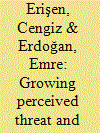

|
|
|
|
|
| Summary/Abstract |
Tolerance is a central concept for a society’s democratic foundations. Many forms of populism threaten tolerance and are a growing concern for consolidated liberal democracies as well developing ones. Right-wing ideology, heightened nationalism, and xenophobic rhetoric toward minorities are threatening social cohesion, public unity, and liberal values. Turkey, subject to various destabilizing recent events, faces specific challenges amid political, social, and economic uncertainties. Using two waves of a nationally representative survey, conducted after each of two general elections in 2015, we studied changes in the behavioral indicators of intolerance in the Turkish electorate. We found that perceived threat and prejudice explain changes in public intolerance during this period. We discuss the implications of our results for the standing of democracy in Turkey.
|
|
|
|
|
|
|
|
|
|
|
|
|
|
|
|
| 4 |
ID:
166147
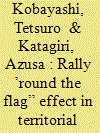

|
|
|
|
|
| Summary/Abstract |
This study examines the impact of China's growing territorial ambitions on Japanese public opinion. By experimentally manipulating perceived territorial threats from China, we tested two potential mechanisms of increased support for a conservative incumbent leader in Japan. The first is the “rally ’round the flag” model, in which threats universally boost support for the leader through emotion. The second is the “reactive liberal” model, in which support from conservatives remains constant, but threatened liberals move toward supporting the conservative leader. Two survey experiments provided no support for the emotion-based “rally ’round the flag” model, but they lent support for the reactive liberal model in explaining the impact on Japanese public opinion. However, the second experiment indicated that priming with an image of the prime minister that highlights his role as the supreme commander of the national defense forces completely eliminated the gain in approval rates among liberals.
|
|
|
|
|
|
|
|
|
|
|
|
|
|
|
|
| 5 |
ID:
080823
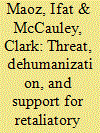

|
|
|
|
|
| Publication |
2008.
|
| Summary/Abstract |
Public opinion can permit or encourage retaliatory aggressive state policies against vulnerable but threatening out-groups. The authors present a model in which public support for such policies is determined by perceived threat from and dehumanization of the target group. This two-factor model predicts Israeli Jews' support for two retaliatory aggressive policies: the more hypothetical notion of Palestinian population transfer and concrete, coercive actions toward Palestinians. The authors find (1) that threat and dehumanization are distinct constructs, each having unique contributions to explaining support for aggressive retaliatory policies, (2) that threat and dehumanization significantly explain support for aggressive retaliatory policies when respondents' hawkishness, socioeconomic status (SES), and education level are taken into account, and (3) that the association of hawkishness and SES with support for aggressive retaliatory policies is largely mediated by threat perception. Results are highly consistent across two studies, suggesting the two-factor model may be useful for understanding support for aggressive action in situations of asymmetric conflict
|
|
|
|
|
|
|
|
|
|
|
|
|
|
|
|
|
|
|
|
|